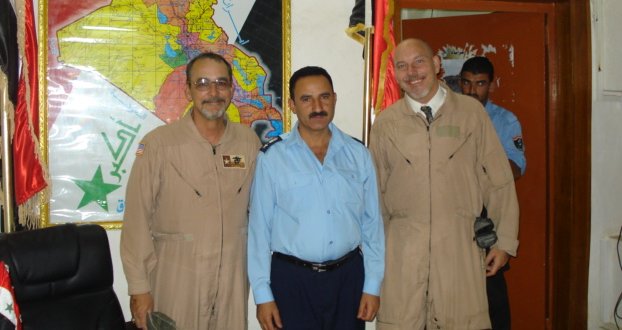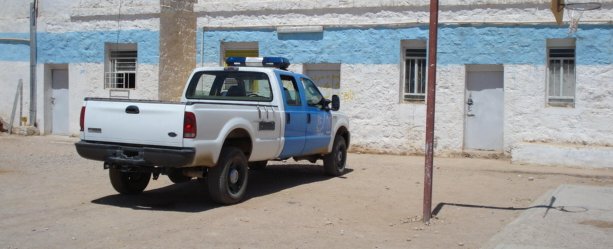Meeting with Rutbah Police Chief

The Police Chief says that he tells everybody about his problems in hopes that the weight of his persistence will convince someone to solve them.
The Rutbah region that is his area of responsibly is vast and thinly populated. It includes the Syrian and Jordanian border areas and the POEs at Waleed and Trabil, the village of Akashat, Nukhayb as well as the Saudi border region and POE Ar-Ar. It takes a lot of police officers, vehicles and fuel to patrol a place like this. Unfortunately, Iraqi government resource allocation decisions are based on population w/o sufficient concern for area.

The chief says he has only 280 IP out of authorized strength of 620. He doesn’t expect to see more any time soon. His patrol fleet consists of sixty-one pickup trucks of various sizes, Chevys and Fords. Even when there is fuel to keep the trucks rolling, they are often inoperable. This is a land of axel-busting roads, when you are lucky enough to find a road. He says that he has people trained to fix the vehicles, but they lack parts and tools to do the job. They used to have their vehicles fixed at Al Asad, but that service recently stopped.
Hammurabi
The Hammurabi Academy, located on Camp Ripper, has trained around 400 Iraqi police from Western Al Anbar since it was founded in July of last year. Classes are small, with a student/instructor ratio of around 7/1. Only leaders are trained. They are supposed to go back and pass their information to the ordinary police, so it is a train the trainers proposition. They learn a variety of tasks such as basic investigation, logistics, administration and evidence gathering techniques. It is not exactly CSI-Iraq, but it is a start.
Colonel Stacy Clardy of RCT 2 set up the academy to produce a leadership core for the Iraqi Police (IP) of our district. It is important to recall that back in July 2007 Al Anbar was just coming out of the terror of the insurgency and significant fighting still raged. My first helicopter landing in Al Anbar was on a soccer field, where I was informed insurgents had rounded up and murdered the local police some months before. These kinds of things were still fresh in the memories of recruits back then. It took courage to volunteer to be an Iraqi cop and I suppose that they must have felt a little relieved to get some training on Camp Ripper, protected by U.S Marines. Now they talk about moving the academy off the base and that will probably happen by next year.
The Marines host the venue, provide some logistics and act as advisors. Most of the funding comes from the government of Iraq and gradually, as equipment is replaced, the Hammurabi Academy is evolved into an almost wholly Iraqi institution.
My impression was that we had U.S. instructors teaching classes with interpreter. I was wrong, or at least out of date. Most instructors today are Iraqis who speak directly to the classes in Arabic. One of the successes of the last year is precisely the development of the human capital to make this work. Iraqi police of the past were often good at being cops in many ways, but not so good at following the rule of law & evidence. Now they are becoming a modern police force.
